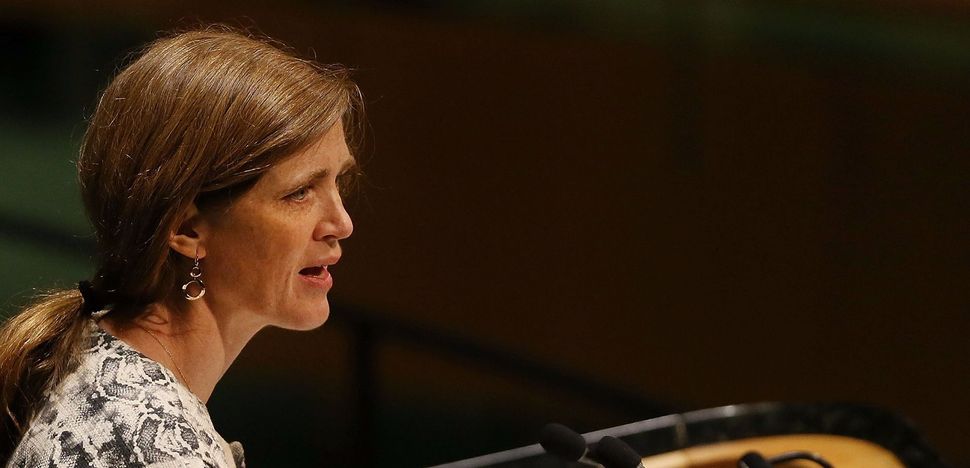Samantha Power Asks Tough Questions of Israel — and Palestinians

Samantha Power at UN. Image by Getty Images
U.S. Ambassador to the United Nations Samantha Power said Sunday that the United States and Israel’s security relationship “has never been stronger.”
Speaking at HaaretzQ, the Israeli newspaper’s daylong event with the New Israel Fund, she stressed U.S. efforts to defend Israel at the United Nations.
“As you all know, the U.N. is a place where Israel is not always treated fairly,” Ambassador Power said. “A bias against Israel at the U.N. does exist,” and that the U.S. is committed to pushing back efforts to delegitimize Israel.
“We need a U.N. that is a model of equal treatment and anti-discrimination at a time when we’re seeing an alarming rise in anti-Semitism,” she said. “At the same time, West Bank settlement growth raises honest questions,” and undermines the prospects for a two-state solution.
She ended her talk with a series of questions: Addressing the Palestinians, she asked how boycotts or efforts to delegitimize Israel would promote dignity and security for the Palestinian people and further the cause of a Palestinian state. For Israel, she asked what to say to members of the international community expressing honest — rather than anti-Semitic — frustration with the conflict. And she asked for an explanation for continued settlement expansion.
The first-of-its-kind HaaretzQ conference was held at the Roosevelt Hotel in Midtown Manhattan. The gathering brought out hundreds, mainly those aligned with the political left.
After Power spoke, Knesset Member Aymen Odeh, an Arab citizen of Israel and the leader of the Joint List political coalition — comprising mostly Arab members of Israel’s parliament — took the stage to raucous applause.
“Good afternoon my friends,” he said in English, then in Arabic and Hebrew.
“As a Palestinian, I cannot accept a world in which there is no place for Palestinians to shape their own future,” he said. “As an Israeli citizen, I know that Israel cannot be a true and just democracy so long as it occupies another people.”
“The occupation is the Palestinian people’s tragedy, but it’s also Israel’s prison,” he went on. “We must liberate both peoples from the prison of occupation.”
Explicitly invoking Martin Luther King and the civil rights struggle, Odeh spoke about the challenges of being what he called “unwanted” in Israel — of sending out resumes knowing your Arab name will outweigh your academic achievements, or hearing your Prime Minister tell his supporters on election day that Arabs are “coming out in droves.”
“How can it be that I still have hope?” He asked. “I have hope because when the government tried to throw us out, we established a Joint List — Arab and Jewish— instead of submitting to segregation. We at the Joint List are living proof that Arabs and Jews can refuse to be enemies.”
Odeh received a long standing ovation. His talk was followed by a conversation between the writers Peter Beinart and Avi Shavit.
Also on Sunday, Odeh, together with the leader of the Reform movement, Rabbi Rick Jacobs, put out a joint statement that they had met at the conference, and believed the promise of a shared future required “honest and difficult” conversations.
The statement came two days after Jacobs, the president of the Union for Reform Judaism, said he was disappointed that Odeh had canceled a meeting with Jewish leaders because it was taking place in space shared by the Jewish Agency.
A message from our CEO & publisher Rachel Fishman Feddersen

I hope you appreciated this article. Before you go, I’d like to ask you to please support the Forward’s award-winning, nonprofit journalism during this critical time.
We’ve set a goal to raise $260,000 by December 31. That’s an ambitious goal, but one that will give us the resources we need to invest in the high quality news, opinion, analysis and cultural coverage that isn’t available anywhere else.
If you feel inspired to make an impact, now is the time to give something back. Join us as a member at your most generous level.
— Rachel Fishman Feddersen, Publisher and CEO























